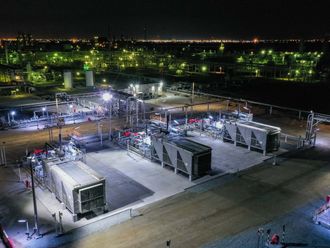Beijing: China will take advantage of falling oil prices to boost imports and build up its fledgling oil reserves against supply shocks, a top official said in a rare disclosure of energy strategies in the wake of the global economic turmoil.
Zhang Guobao, head of the National Energy Administration, said in remarks published yesterday that China would actively push forward construction of the second phase of state strategic oil reserves, having largely completed the first.
The government has never disclosed if the tank farms set up in four locations in the first phase - with total capacity of some 102 million barrels - have been fully filled.
Although Zhang's words about "completion" of the first phase were ambiguous, since they could refer either to building or filling the tanks, they lent credence to signs that the world's second-largest oil consumer has at least started filling a third base in Huangdao.
Industry sources said around 7.3 million barrels of oil had been injected into Huangdao in November and more stockpiling was planned in December and January.
The first two bases, at Zhenhai and Zhoushan, were up and running more than a year ago. Construction of the Dalian facility, the fourth base, was due for completion by year-end.
China has completed planning of the second phase of government storage facilities that could hold up to 26.8 million cubic metres of oil, or some 170 million barrels, but hasn't disclosed where the facilities are located or whether construction has begun.
Oil prices are on track for a near 60 per cent drop this year, the biggest annual fall since futures began trading 25 years ago, and are down more than $108 (Dh396.7) a barrel from its July record-peak.
China's plan to raise imports for its reserves could offer some short-term hope on global demand, which has been dented by fears of a deepening global recession.
The country would also encourage its oil firms to use spare storage capacity to increase commercial stockpiling, Zhang said in a report in the People's Daily.
State-owned Sinopec completed the construction of storage tanks with a capacity of 3.8 million cubic metres in coastal Zhejiang province last week, while rival PetroChina has begun to fill a new 1 million cubic metre facility in northwestern Xinjiang region with Kazakhstan oil.
Private fuel traders, long living under the shadow of the oil duopoly due to short independent fuel supplies, have also indicated they are interested in storing government oil, state media has reported.
China would take advantage of opportunities from the weak energy markets to expand energy cooperation with neighbouring countries and major producers, Zhang said.
It would push forward the construction of China-Myanmar oil and gas pipelines while proceeding with China-Central Asia gas pipes, he said.












